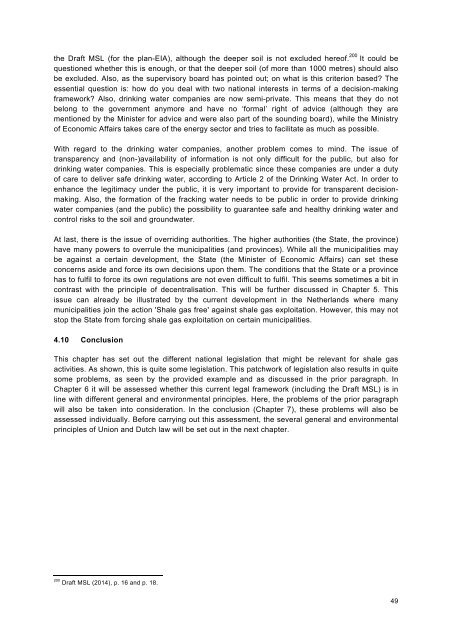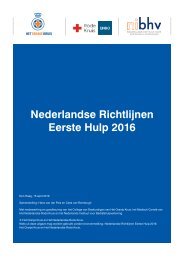Thesis-Anne-Vos-Masters-SBR-and-EU-Law-3
Thesis-Anne-Vos-Masters-SBR-and-EU-Law-3
Thesis-Anne-Vos-Masters-SBR-and-EU-Law-3
Create successful ePaper yourself
Turn your PDF publications into a flip-book with our unique Google optimized e-Paper software.
the Draft MSL (for the plan-EIA), although the deeper soil is not excluded hereof. 200 It could be<br />
questioned whether this is enough, or that the deeper soil (of more than 1000 metres) should also<br />
be excluded. Also, as the supervisory board has pointed out; on what is this criterion based? The<br />
essential question is: how do you deal with two national interests in terms of a decision-making<br />
framework? Also, drinking water companies are now semi-private. This means that they do not<br />
belong to the government anymore <strong>and</strong> have no ‘formal’ right of advice (although they are<br />
mentioned by the Minister for advice <strong>and</strong> were also part of the sounding board), while the Ministry<br />
of Economic Affairs takes care of the energy sector <strong>and</strong> tries to facilitate as much as possible.<br />
With regard to the drinking water companies, another problem comes to mind. The issue of<br />
transparency <strong>and</strong> (non-)availability of information is not only difficult for the public, but also for<br />
drinking water companies. This is especially problematic since these companies are under a duty<br />
of care to deliver safe drinking water, according to Article 2 of the Drinking Water Act. In order to<br />
enhance the legitimacy under the public, it is very important to provide for transparent decisionmaking.<br />
Also, the formation of the fracking water needs to be public in order to provide drinking<br />
water companies (<strong>and</strong> the public) the possibility to guarantee safe <strong>and</strong> healthy drinking water <strong>and</strong><br />
control risks to the soil <strong>and</strong> groundwater.<br />
At last, there is the issue of overriding authorities. The higher authorities (the State, the province)<br />
have many powers to overrule the municipalities (<strong>and</strong> provinces). While all the municipalities may<br />
be against a certain development, the State (the Minister of Economic Affairs) can set these<br />
concerns aside <strong>and</strong> force its own decisions upon them. The conditions that the State or a province<br />
has to fulfil to force its own regulations are not even difficult to fulfil. This seems sometimes a bit in<br />
contrast with the principle of decentralisation. This will be further discussed in Chapter 5. This<br />
issue can already be illustrated by the current development in the Netherl<strong>and</strong>s where many<br />
municipalities join the action 'Shale gas free' against shale gas exploitation. However, this may not<br />
stop the State from forcing shale gas exploitation on certain municipalities.<br />
4.10 Conclusion<br />
This chapter has set out the different national legislation that might be relevant for shale gas<br />
activities. As shown, this is quite some legislation. This patchwork of legislation also results in quite<br />
some problems, as seen by the provided example <strong>and</strong> as discussed in the prior paragraph. In<br />
Chapter 6 it will be assessed whether this current legal framework (including the Draft MSL) is in<br />
line with different general <strong>and</strong> environmental principles. Here, the problems of the prior paragraph<br />
will also be taken into consideration. In the conclusion (Chapter 7), these problems will also be<br />
assessed individually. Before carrying out this assessment, the several general <strong>and</strong> environmental<br />
principles of Union <strong>and</strong> Dutch law will be set out in the next chapter.<br />
200<br />
Draft MSL (2014), p. 16 <strong>and</strong> p. 18.<br />
49



